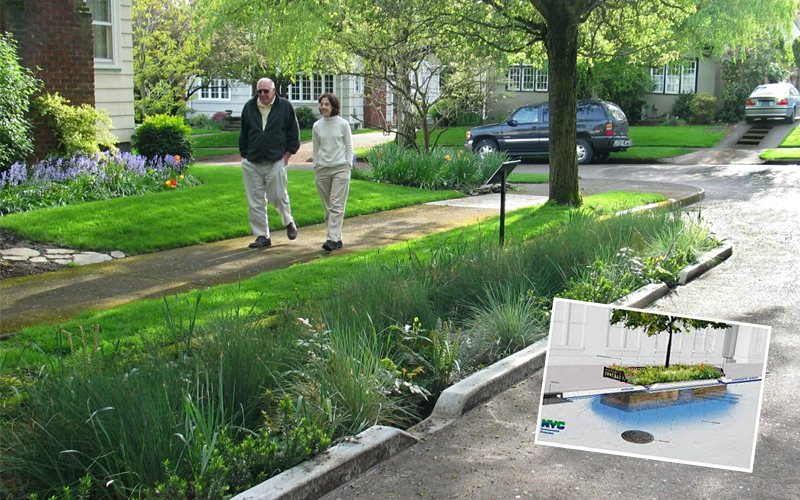Today at 10 a.m., the Council Transportation and Infrastructure Committee, chaired by Selvena Brooks-Powers, will take up the issue of preventing floods in the city. Here's an opinion piece by a staffer at Transportation Alternatives urging the Council to think more broadly about infrastructure than just what's underground.
The weather is getting hotter, wetter, and more destructive. We're not going to abandon these archipelagos we call home, so we need to make them more resilient to climate change. That starts with less pavement and more permeable surfaces.
As Hurricane Ida swept through New York City last fall, apartments flooded, subway service shut down, and our streets turned into rivers. An entire month’s worth of rain fell on New York in a matter of hours — and there was no place for the water to go.
When drains back up, stormwater searches for any opening it can find — apartments, subway grates, and station entrances. At present, 72 percent of New York City’s land area is impervious to water, making flash flooding more common and dangerous.
Extreme weather is not going away. Already this year, we’ve seen subways flood from less rain than Ida brought. Our leaders must adapt New York City to protect our neighbors, our transit system, and our neighborhoods from the dangers flash flooding creates.
One immediate solution: Turn asphalt into a resilience tool.
We must transform impervious driving lanes into green climate solutions. For example, we should build bioswales — landscape elements designed to absorb and filter stormwater before it enters the sewer system — in place of parking.
Even a single tree planted in a small pit can reduce rain runoff by around 60 percent, even during the winter.
City leaders should be adding these greenspaces citywide. In addition to mitigating the risk of flood buildup across the city, parks, gardens, and bioswales are tools to fight climate change.
And, if asphalt can be transformed into an asset, New York City has a lot of it.
Central Queens has 1,600 acres of roadbed. Yet right of way green infrastructure make up just three acres, according to a recent report from the Regional Plan Association.
Citywide, Mayor Eric Adams controls 6,300 miles of streets and three million free parking spaces. By converting just a portion of that to greener and more resilient uses, he can save lives and billions of dollars. A vision of what could be is outlined in Transportation Alternatives’ NYC 25x25 challenge, a call for our leaders to repurpose 25% of our streetspace to better uses by 2025.
To begin, he must repurpose some of our street space for tools such as bioswales, prioritizing areas in highest need. While the loss of some free parking for inanimate objects may raise concerns from a few loud voices, it pales in comparison to the loss of life and livelihood in the aftermath of a storm.
Rather than be the cause of, our streets can become the solution to climate change and flooding. We need leaders with the vision and will to repurpose our streets into pathways for resiliency.






